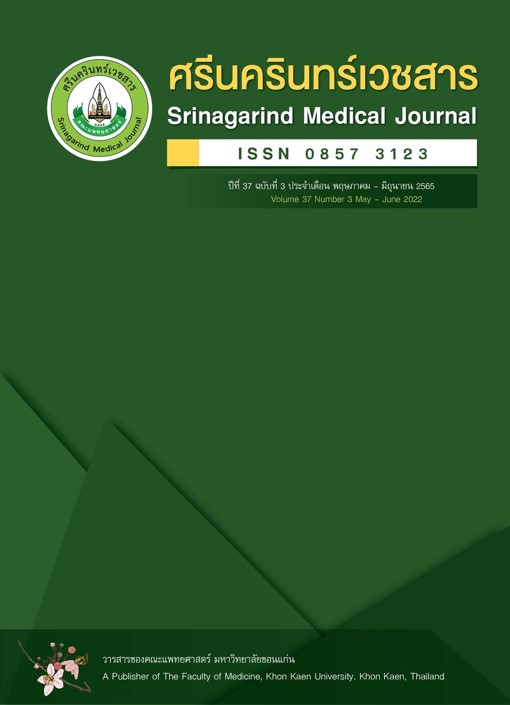Incidence and Quality of Life of Early Childhood with Thyroid stimulating hormone greater than 25 mU/L in Sakon Nakhon Hospital
Keywords:
Quality of Life, Early childhood, Thyroid stimulation hormoneAbstract
Background and Objective: Infants with Thyroid-stimulating hormone greater than 25 mU/L (TSH > 25 mU/L) are more likely to have developmentally delayed, cognitive and motor impairment, affecting the quality of life of children. This study aimed to determine the incidence of newborns with congenital hypothyroidism, and quality of life in early childhood with TSH > 25 mU/L.
Methods: This descriptive study was conducted on 27 early childhood who had TSH levels greater than 25 mU/L, and their caregivers from 2016 to 2020 in Mueang district, Sakon Nakhon province. Data was collected at well-baby clinics by questionnaires. The index of item objective congruence was at .89 and Cronbach’s alpha coefficient was 0.85. The data was analyzed using descriptive statistics.
Result: The incidence of newborns with congenital hypothyroidism was 1:1,116. The overall quality of life in early childhood with TSH > 25 mU/L was poor at 75.6%. The lowest score was the social relationship and physical health 67.6%, and 72.7%, respectively. Most of them have a poor level of health and wellness at 79.6%.
Conclusions: Incidence of congenital hypothyroidism in Sakon Nakhon hospital still high, and most early childhood had poor quality of life. There is a need for all pregnant women to take an iodine supplement every day, and take care of the growth, and stimuli of the newborn to improve social, physical, and quality of life.
References
Children's Endocrine Society of Thailand. Guidelines for the diagnosis of congenital hypothyroidism. Thaipediatrics.org. 2014. [Cited July 21, 2020]. Available from at: https://www.thaipediatrics.org>media _20161129115405.
World Health Organization/International. Council for the control of the Iodine deficiency disorders/United Nations Children Fund (WHO/ICCIDD/UNICEF). Assessment of the iodine deficiency disorders and monitoring their elimination: a guide for program manager. 3rd ed. Geneva, WHO, 2007.
Lau CS, Joseph R, Aw TC. Screening for Congenital Hypothyroidism. Ann Acad Med Singap 2020;49(12):934-6.
Harris KB, Pass KA. Increase in congenital hypothyroidism in New York State and in the United States. Mol Genet Metab 2007;91(3):268-77.
Naafs JC, Marchal JP, Verkerk PH, Fliers E, Trotsenburg ASPv, Zwaveling-Soonawala N. Health-related quality of life in patients with early-detected Central Congenital, hypothyroidism. J Clin Endocrinol Metab 2021;106(10):e4231-41.
Rochmah N, Faizi M, Dewanti C, Suryawan A. Pediatric quality of life in congenital hypothyroidism: an Indonesian study. Int J Thyroidol 2020;13(2):150-4.
Nuwanna R. Neonatal screening for hypothyroidism at Wapipathum hospital. Thai J Pediatr 2014;53(3):189-98.
Kanjanapattakul W. Thyrotropin screening for congenital hypothyroidism in the queen Sirikit national institute of child health during year 2007-2018. Department of Health Service Support Journal 2020;16(3): 5-12.
Saengubol N. Incidence of congenital hypothyroidism at Phon hospital, Khon Kaen. Thai J Pediatr 2012;51(2):127-32.
Punchuey S. Case study compared normal newborn with abnormal screening and congenital hypothyroidism in Krabi. Thai J Pediatr 2013; 52(3):209-18.
Pinyopornpanit P. Screening program for congenital hypothyroidism in Sukhothai hospital. J Prevent Med Assoc Thai 2015;5(2):120-7.
Kuptanon C, Sawasdivorn S, Kabchan P. Congenital hypothyroidism from newborn screening in Thailand. J Health Sys Res 2018;12(3):452-5.
Apiwantanagul S, Sirichaipornsak S, Boonapai N. Iodine deficiency disorders of the newborn and development in early childhood in Sakon Nakhon Hospital. Srinagarind Med J 2020;35(4):390-6.
Nopmaneejumruslers K, Kiatrungrit K, Yongyuan B, Seree P, Mohsuwan L,
Musikaphan W, et al. Quality of life in early childhood. BKK Pro; 2016.
Mahatnirankul S, Tantiphiwattanasakul W, Pumpaisalchai W, Wongsuwan K, Pornmanajirangkul R. Thai quality of life indicators of the World Health Organization.
(WHOQOL–BREF–THAI). DMH. 1997. [Cited Aug 25, 2020]. Available at: https://www.dmh.go.th/abstract/nurse/details.asp?id=2352https://www.dmh.go.th/test/download .
Hayeese W, Sap-In N, Wangsawat T, Chaimongkol N. Quality of life of Muslim preterm infants in three Southernmost provinces of Thailand. Princess Naradhiwas University J 2015;7(1):1-14.
Khwanngern P, Sripichyakan K, Laowong A, Singnon J. Relationship between knowledge and eating behavior foriodine deficiency prevention in pregnant women. Nursing Public Health Educ J2020;21(1):31-40.
Apiwantanagul S. Comparison of urinary iodine levels of pregnant women and women of childbearing age in Muang District Sakon Nakhon Province. Sakon Nakhon Hosp J 2012;15(2):32-40.
National Center for Newborn Health Screening Practices, Department of Medical Sciences. Screening results (monthly). [Cited July 21, 2020]. Available from http://www.neoscreen. go.th/web/index.php.
Cao XY, Jiang XM, Dou ZH, Rakeman MA, Zhang ML, O’Donnell K, et al. Timing of vulnerability of the brain to iodine deficiency in endermic cretinism. N Engl J Med 1994;331(26):1739-44.
Punthmatharith B, Buddharat U, Wattanasit P. Quality of life and factors influencing quality of life of cancer children in southern Thailand. Songkla Med J 2008;26(5):501-11.
Ngampraphasom P. Quality of life in Children with transfusion-dependent thalassemia at Phrae Hospital. J Phrae Hosp 2020;28(1):12-26.
Wattanarungsun P. Asthma knowledge, level of control and quality of life in asthmatic children at Chaoprayayomraj Hospital. Thai J Pediatr 2013;52(3):227-35.
Downloads
Published
How to Cite
Issue
Section
License
Copyright (c) 2022 Srinagarind Medical Journal

This work is licensed under a Creative Commons Attribution-NonCommercial-NoDerivatives 4.0 International License.




